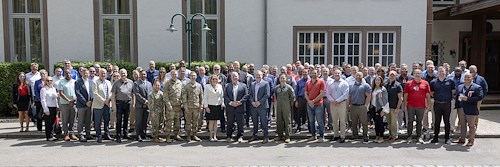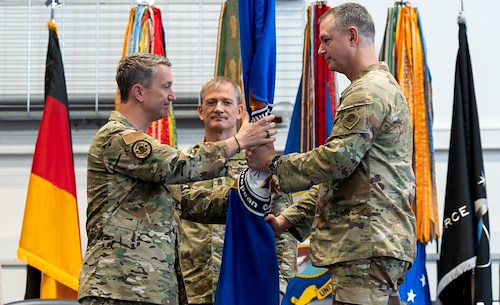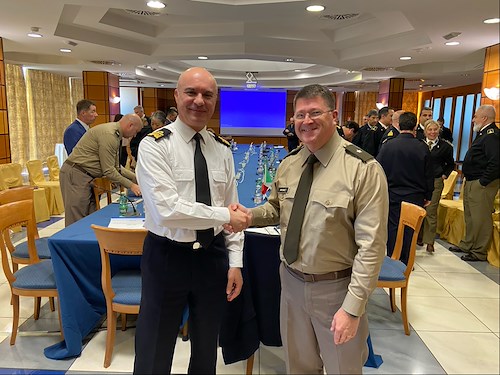Introduction
Chairman Wicker and distinguished members of the Helsinki Commission, it is my honor to testify before you today on behalf of United States European Command (USEUCOM) Commander GEN Wolters and the over 68,000 brave and dedicated men and women who are currently operating in the European Theater. The threats facing U.S. interests in the USEUCOM area of responsibility are real and growing; our ability to counter these threats depends on this highly motivated team of patriots who constantly strengthen solidarity and unity with our Allies and partners as they improve the lethality and warfighting readiness of our Joint Force. Defending Europe is an essential element of defending the United States given our shared values, adherence to the rule of law, and common economic prosperity. As stated in the National Defense Strategy (NDS), a strong and free Europe, bound by shared principles of democracy, national sovereignty, and commitment to Article 5 of the North Atlantic Treaty is vital to our security.
As demonstrated last month in the U.S./Poland Joint Declaration, Estonia, Latvia, Lithuania and Poland are a focal point of U.S. and NATO deterrence and defense posture and activities as Russia attempts to intimidate these nations, both politically and militarily. Consistent with the direction of the NDS, the United States is fielding - alongside our European Allies and partners – an interoperable and multi-domain combat-credible force that underscores our shared deterrent mission, and demonstrates an unwavering commitment to the collective defense provisions of the North Atlantic Treaty from all NATO members. When the Kremlin looks to the West, they see a cohesive Alliance that has both the military capability, and political will to defend its member nations.
Knowing the military strength of the Euro-Atlantic Alliance, Russia seeks to engage us in a competition below the level of armed conflict in order to exploit asymmetric advantages. We are actively engaged in that competition, and it is one that requires all elements of our national power and alliance structures to succeed. The Joint Force of the United States combined with
the capabilities and capacity of our NATO Allies and partners are a powerful force of historical proportions and continue to demonstrate to Russia the capability and will to honor our collective security agreements. In cooperation with our NATO partners, we seek to deter Russian adventurism as well as address other key challenges, including trans-national terrorists, and addressing the arc of instability building on NATO’s periphery.
Russia – the primary threat to the Euro-Atlantic Alliance
Russia is a long term, strategic competitor that wants to advance its own objectives at the expense of Transatlantic prosperity and security. It sees the United States and the NATO Alliance as the principle threat to its geopolitical ambitions. Moscow continues to demonstrate a willingness to violate international law, to exercise malign influence, and to threaten the Transatlantic community’s shared interest in preserving a strong and free Europestrong and.
Moscow seeks authoritative control over nations along its periphery and is intent on undermining NATO by actively seeking and exploiting fissures in Alliance solidarity. President Putin continues to actively pursue global influence with aggressive foreign and security policies concerning the sovereign countries on Russia’s periphery. Russia continues to expand its capacity for malign influence in Europe and abroad, including in the United States.
Russia seeks to gain advantage over the U.S. and its European Allies through non- compliance with long-standing arms control treaties. Its violation of the Intermediate-Range Nuclear Forces (INF) Treaty, Treaty on Open Skies, and Conventional Armed Forces in Europe Treaty allows Russia to develop capabilities as well as posture them in an advantageous manner due to our historical adherence to these treaties. The capability imbalance created by Russia’s violation of the INF Treaty is especially concerning and presently holds much of Europe at risk from systems banned by the Treaty, and is the reason the Treaty will terminate on August 2 unless Russia returns to full and verifiable compliance. Russia recklessly ignores
long-standing professional and safety practices in the air and at sea, as demonstrated by the recent unprofessional maneuvers of a Russian aircraft in the East Mediterranean and the Russian destroyer Admiral Vinogradov’s unsafe maneuver within 50-100 feet of the USS Chancellorsville in the Philippine Sea.
The most blatant example of Russia’s willingness to use aggression in the disregard of another nation’s sovereignty is in Russia’s self-proclaimed near abroad. Russia invaded Ukraine, seized Crimea, launched cyber-attacks against the Baltic States and Ukraine, and most recently, unjustifiably attacked, and then seized and detained Ukrainian vessels and sailors in the Sea of Azov. After the 2008 Russo-Georgian War, Russia purported to recognize the independence of the Georgian regions of South Ossetia and Abkhazia, and stationed troops on sovereign Georgian territory. Russia currently occupies a fifth of Georgian territory and maintains a significant military and border security presence in and around Abkhazia and South Ossetia.
Russia is committed to achieving its strategic objectives in Europe without direct military conflict and through a combination of military and non-military indirect actions designed to exploit weaknesses and fissures in targeted countries. These efforts seek to fracture political and security institutions in Europe and discredit and subvert democratic processes. The Kremlin employs a whole of society approach through a wide array of tools to include political provocateurs, information operations, economic intimidation, cyber operations, religious leverage, proxies, special operations, as well as conventional military forces.
President Putin’s autocratic approach to governing has transformed Russia’s oligarchs into an independent and powerful societal element with enormous influence. The oligarchs serve at the pleasure of President Putin, and both gain and exercise economic control for the state and for themselves. It is estimated that just over a 100 individuals control a third of Russia’s wealth. These oligarchs provide the Kremlin with a corrupt and de-stabilizing NGO-like influence both internal and external to Russia.
Strengthen Allies and Attract New Partners
The ties that bind the Euro-Atlantic Alliance are knotted with a shared belief in the value and importance of democratic institutions. Our nations’ leaders must be accountable to the people that elected them into office. This includes checks and balances between branches such as legislative oversight of the executive branch and independent Court systems. Civilian leadership of the military is essential to a balanced government that will not imprudently seek armed conflict to achieve national objectives. We also embrace diversity, not only as the right thing to do, but as a central source of our strength. We embody diversity among our respective nations, but also within individual countries, having equal rights and opportunities for all people regardless of their race, gender, or sexual orientation. We also share a firm belief that the need for prosperity is rooted in our economic value and market based systems that continue to drive the global economy and prosperity for all.
One of the most visible demonstrations of the commitment of the United States government to Transatlantic security is the European Deterrence Initiative (EDI). Since 2015, the United States Congress has authorized and appropriated nearly $17 Billion in EDI funds in response to Russia’s aggression and malign influence. EDI underwrites our nation’s enhanced deterrence and defense posture throughout the theater by positioning the right capabilities, in key locations, in order to respond to adversarial threats in a timely manner. EDI also signals to our NATO Allies and partners of the United States’ commitment to Article 5 and the territorial integrity of all NATO nations, and is a major source of sustaining Alliance cohesion. Lastly, EDI increases the capability and readiness of U.S. Forces, NATO Allies, and regional partners, allowing for a faster response in the event of aggression by a regional adversary against the sovereign territory of NATO nations.
Baltic nations have participated and specifically benefitted from EDI funding in improvements to posture, enhanced training, and improved infrastructure. For example, U.S. Air Forces Europe (USAFE) is working with the Baltic nations to further develop infrastructure and host nation support at airfields such as Lielvārde Air Base in Latvia and Ämari Air Base in Estonia. Additionally, the U.S. Marine Corps executes engagements and participates in bilateral and multilateral exercises with the Baltic nations to improve tactical combined arms integration.
Following Russia’s attempted annexation of Crimea and invasion of eastern Ukraine, the United States and NATO immediately re-focused our engagements along the Alliance’s Eastern flank, including in the Baltic region. As former Soviet-occupied states, the Baltics share geographic proximity as well as historic relations with Russia. Given Russia time-distance advantages and a communicated desire to regain control in their former buffer states, the National Defense Strategy makes clear that the United States will continue to improve its lethality and combat credible forward posture to bolster our deterrence in the region.
The Baltics are a focus area for U.S. security assistance in Europe. In FY18, USEUCOM’s Building Partnership Capacity (BPC) activities included border security initiatives, enhancing counter-transnational threats, and Special Operations Forces (SOF) and vertical lift capabilities. Section 333 of the National Defense Authorization Act (NDAA) Global Train and Equip funding is particularly helpful in applying a regional Baltic approach to security cooperation and conducting BPC activities across multiple warfighting functions. Lastly, USEUCOM is working a proposed $435 million Integrated Air and Missile Defense (IAMD) project to assist Lithuania, Latvia, and Estonia’s development of a robust command and control network. This new critical IAMD capability will contribute to NATO deterrent efforts and contributes to the overall combat- credibility of our combined force posture. Our security cooperation efforts in the Baltics are rapidly building capability and demonstrating alliance unity.
We have shifted significant U.S. forces in the Baltic region by adopting changes in Operation ATLANTIC RESOLVE. Previously, there was one U.S. Company on six-month rotations in
each of the Baltic nations; we now support a periodic, exercise-based presence in the region in addition to undertaking lead nation responsibilities for the NATO Enhanced Forward Presence (eFP) battle group in Poland. ; The U.S. eFP Battle Group became fully operationally capable in 2017 in Poland, while the United Kingdom, Canada, and Germany act as framework nations for eFP Battle Groups in Estonia, Latvia, and Lithuania respectively. The U.S. also participates in NATO Force Integration Units (NFIUs) in the Baltics with a small contingent of U.S. personnel assigned to each NFIU.
The Baltic region is also a major focus area for USEUCOM and NATO exercises.
AUSTERE CHALLENGE is the Command’s premiere staff training event to address the Russian Problem Set. AUSTERE CHALLENGE 2019 validated elements of our contingency planning and increased Service Component specific execution in support of major combat operations.
Our Northern Exercise series is executed every even numbered year and allows synergistic and massed deterrent effects by linking our Joint Exercise Program, Service Component Title 10 exercises, and NATO and partner nation exercises. Additionally, through Naval Striking and Support Forces NATO (STRIKFORNATO), the U.S. co-leads (with Germany) the annual Baltic Operations (BALTOPS) exercise to practice high-end warfare and amphibious landing capability and interoperability in the Baltic Sea.
USEUCOM and NATO continue to execute operational efforts to ensure interoperability with our Baltic Allies, demonstrate NATO resolve, and deter Russian aggression in the Baltic region. USEUCOM supports NATO activities in the region reinforcing NATO Article 3 and 5 obligations such as NATO’s Baltic Air Policing (BAP) mission. The USS Gridley serves as the Flagship for the Standing NATO Maritime Group 1 providing persistent maritime presence in the Baltic and North Sea. U.S. Army Europe (USAREUR) is conducting operations as part of their Emergency Deployment Readiness Exercise in the Baltics with CONUS-based rotational armored forces.
And USAFE maintains a persistent aviation detachment in Lask, Poland.
Cyber defense is another key focus area for USEUCOM and NATO. The Fiscal Year 2019 NDAA advanced cyberspace operations and identified U.S. policy in cyberspace as “multi- pronged,” - building response, denial, and cost-imposition options. USEUCOM’s Joint Cyber Center (JCC), in coordination with USCYBERCOM, is building up its Integrated Planning Teams as a central and key element in our planning and exercises. Both the AUSTERE CHALLENGE and GLOBAL LIGHTNING exercises integrated cyber activities in their initial phases. Our JCC is working with Allies to refine the NATO cyberspace operations center standard operating procedures and doctrine to accommodate voluntary contributions of cyberspace capabilities in support of allied operations and movements.
To mitigate Russia’s time / distance advantages, USEUCOM is working alongside our Allies and partners to enhance our Indications and Warnings (I&W) of any potential aggression. We are leveraging language expertise resident in European nations and are utilizing non-traditional ISR platforms to mitigate the global shortage of high-demand, low-density assets. We continue to grow our intelligence and analytical capability to meet our steady state and contingency planning requirements.
Together, we stand in solidarity with all of NATO in support of our Baltic Allies.
Spreading the costs of this commitment is important and the four nations in this region have already demonstrated their willingness to contribute, by meeting their NATO burden-sharing commitment to spend 2% of GDP on defense.
Conclusion
EDI continues to be essential to our forward deployment of personnel and equipment as we work with our NATO Allies to increase our responsiveness and agility along the Eastern flank. Fielding a combat-credible force that routinely demonstrates its capability and willingness will remain a pillar of our deterrence mission and to ensure Europe remains strong and free.
We remain committed to increasing our capabilities and demonstrating our readiness in the region through exercises such as BALTOPs; and although we already have significant capabilities to continue to deter Russia, we also know that we are always stronger together.
Fortunately, we are not alone in meeting these challenges. As stated in the U.S. National Security Strategy, the NATO Alliance of free and sovereign states is one of our greatest advantages over our competitors and the United States remains committed to Article 5 of the North Atlantic Treaty. This goes beyond augmenting U.S. forces with enablers and force multiplying capacity. Our bonds are strengthened by a shared commitment to collective defense, democratic principles, and mutual respect of national sovereignty. Ultimately, the United States is safer when Europe is prosperous and stable and we work on daily basis to defend our shared interests and Western democratic values.




